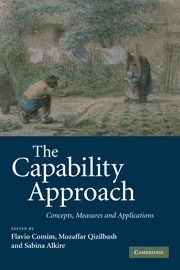Book contents
- Frontmatter
- Contents
- List of figures
- List of tables
- List of contributors
- List of acronyms
- Acknowledgements
- Introduction
- 1 Using the capability approach: prospective and evaluative analyses
- PART I Concepts
- PART II Measures
- PART III Applications
- 12 Democracy, decentralisation and access to basic services: an elaboration on Sen's capability approach
- 13 Reinforcing households' capabilities as a way to reduce vulnerability and prevent poverty in equitable terms
- 14 Capabilities over the lifecourse: at what age does poverty damage most?
- 15 Social policy and the ability to appear in public without shame: Some lessons from a food relief programme in Kinshasa
- 16 The capability approach and gendered education: some issues of operationalisation in the context of the HIV/AIDs epidemic in South Africa
- 17 Women and poverty in Mozambique: is there a gender bias in capabilities, employment conditions and living standards?
- 18 From the quantity to the quality of employment: an application of the capability approach to the Chilean labour market
- Index
- References
15 - Social policy and the ability to appear in public without shame: Some lessons from a food relief programme in Kinshasa
Published online by Cambridge University Press: 22 September 2009
- Frontmatter
- Contents
- List of figures
- List of tables
- List of contributors
- List of acronyms
- Acknowledgements
- Introduction
- 1 Using the capability approach: prospective and evaluative analyses
- PART I Concepts
- PART II Measures
- PART III Applications
- 12 Democracy, decentralisation and access to basic services: an elaboration on Sen's capability approach
- 13 Reinforcing households' capabilities as a way to reduce vulnerability and prevent poverty in equitable terms
- 14 Capabilities over the lifecourse: at what age does poverty damage most?
- 15 Social policy and the ability to appear in public without shame: Some lessons from a food relief programme in Kinshasa
- 16 The capability approach and gendered education: some issues of operationalisation in the context of the HIV/AIDs epidemic in South Africa
- 17 Women and poverty in Mozambique: is there a gender bias in capabilities, employment conditions and living standards?
- 18 From the quantity to the quality of employment: an application of the capability approach to the Chilean labour market
- Index
- References
Summary
Introduction
The success or failure of poverty programmes crucially depends on the behavioural response they generate from both the ‘poor’ and the ‘non-poor’. Amartya K. Sen discusses this issue in some recent publications on social policy (Sen 1995; 1999), arguing among other things that ‘capability-oriented reasonings in dealing with targeting problems have some distinct merits with regard to incentive compatibility’ (1995: 19). More specifically, Sen believes that targeting problems could be significantly reduced by structuring social policy initiatives in response to specific capability deprivations, such as illiteracy, sickness, malnourishment, etc. This is the essence of his ‘instrumental argument’ in favour of the capability approach, besides the better-known ‘fundamental argument’ (Sen 1999: 131). In the present contribution, I challenge the instrumental argument by proposing a more complex use of capability-oriented reasoning. To this end, I emphasise the plurality of concerns, which is in fact also part and parcel of Sen's approach. Indeed, Sen's suggestion that capabilities better reflect the decisional concerns of the potential ‘targets’ becomes much more convincing if we broaden the inventory of relevant functionings. More specifically, I consider whether the ability to appear in public without shame might be one of the more relevant determinants of human agency and hence of the behavioural response to social policy initiatives. In Sen's work, the term ‘agent’ refers to ‘someone who acts and brings about change, and whose achievements can be judged in terms of her own values and objectives’ (Sen 1999: 19).
- Type
- Chapter
- Information
- The Capability ApproachConcepts, Measures and Applications, pp. 458 - 488Publisher: Cambridge University PressPrint publication year: 2008
References
- 5
- Cited by



